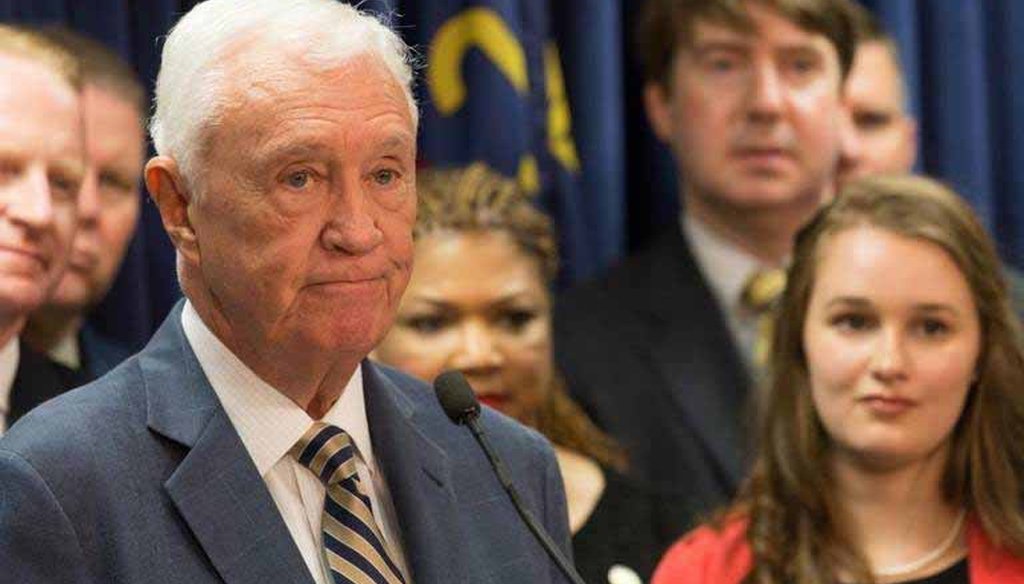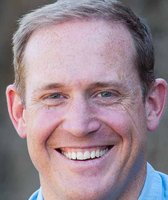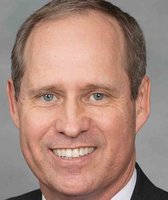Get PolitiFact in your inbox.

im Gardner, a former Republican N.C. lieutenant governor and U.S. congressman, speaks at a press conference in support of the state's 'Raise The Age' bill
In North Carolina a diverse group of supporters are pushing for a new law to stop automatically treating 16- and 17-year-olds as adults in the criminal justice system.
Supporters say the bill should begin moving through the General Assembly in the next week or two.
So we wanted to take a closer look at some claims about this proposed change, which is commonly called "Raise The Age."
We’ve already checked one claim. In December, Rep. Duane Hall – a Raleigh Democrat who has sponsored a version of this bill several times in years past – said North Carolina could save "literally tens of millions of dollars" if it passed this bill into law.
We rated that Mostly True.
Now, we explain the facts surrounding some additional claims that came Monday when supporters held a press conference at the N.C. General Assembly.
Rep. David Lewis: Only 3 percent of the crimes for which 16- and 17-year-olds in North Carolina were convicted last year would’ve made it to adult court in other states.
Even when states do treat 16- and 17-year-olds as juveniles, they leave open the possibility for some to be tried as adults. Violent felonies, like rape, murder or serious assaults, are automatically sent to adult court.
But Republican Rep. David Lewis, the chairman of North Carolina’s powerful Rules committee in the House, said such circumstances would be rare here.
Lewis tweeted that "96.7% of North Carolina convictions of 16,17 yr old in the last year were for non-violent felonies or misdemeanors."
That’s true, and we’re impressed with Lewis’ ability to fit all that into 140 characters on Twitter.
State statistics show 80.4 percent of 16- and 17-year-olds convicted last year were convicted of misdemeanors. Another 16.3 percent were convicted of nonviolent felonies.
Out of all 5,689 convictions of 16- and 17-year-olds last year, 187 were for violent felonies.
Supreme Court Chief Justice Mark Martin: "We are the only state in the country that automatically prosecutes 16-year-olds charged with minor, nonviolent offenses in adult court."
In a rare move, the chief justice of the North Carolina Supreme Court is publicly supporting this bill.
Mark Martin, a Republican who has been on the state’s top court since 1999, said North Carolina is now alone in treating every 16-year-old as an adult, no matter how minor the offense.
"Now, I hate to be the bearer of bad news," Martin said at a press conference Monday. "But North Carolina now stands alone. We are the only state in the country that automatically prosecutes 16-year-olds charged with minor, nonviolent offenses in adult court."
He’s basically correct.
North Carolina and New York had been the only states that also treated all 16-year-olds as adults. But last month the New York legislature passed a bill – quickly signed into law by Gov. Andrew Cuomo – to raise the age for automatic adult charges from 16 to 18.
However, Martin’s claim might have jumped the gun, since the New York law hasn’t yet gone into effect. Technically, there’s a chance North Carolina could still beat New York to the punch.
New York courts will stop treating all 16-year-olds as adults on Oct. 1, 2018, and will stop treating all 17-year-olds as adults on Oct. 1, 2019.
Meanwhile, there are three versions of the North Carolina "Raise The Age" bill. Two of them would go into effect for both 16- and 17-year-olds on Dec. 1, 2019 (after New York).
But another version of the bill would go into effect July 1, 2018. That would beat New York.
Mark Martin: "We already have raised the age in many areas of our state."
Another claim from the chief justice that caught our attention was that not every teen in North Carolina has equal opportunities.
"A justice system only works when similar cases are handled in a similar fashion," Martin said. "We already have raised the age in many areas of our state. Now we need to make sure that promise is there for every one of our young people."
Martin is mostly right about this, too.
Of the state’s 100 counties, 11 have diversion programs to try to keep 16- and 17-year-olds who get arrested for minor crimes from being formally charged, let alone convicted. Instead, they go through counseling, classes and community service.
Durham was the first county to start such a program, in 2014, according to the Southern Coalition for Social Justice.
But according to the coalition, "some eligible youth inevitably slip through the cracks" because even the counties that do have the programs don’t reach all the teens who ought to qualify.
Judge Bill Webb: "It has been a bipartisan, nonpartisan effort."
Before this year’s push for a "Raise The Age" bill, the N.C. courts system conducted a lengthy study into the issue. The chairman of the study committee was Bill Webb, a retired federal judge from the Eastern District of North Carolina.
Webb said he supports the bill, as does a large cross-section of the state’s politicians and interest groups.
"It has been a bipartisan, nonpartisan effort," he said.
That’s fair.
Law enforcement groups support the change, as do civil rights groups. Political groups like the conservative John Locke Foundation and the liberal N.C. Justice Center also both support it, as do nonpartisan entities like the North Carolina judicial branch and even the state prison system.
There’s also bipartisan legislative support. That has also been the case in the past when versions of this bill have failed, but this year it has even broader support.
If it comes up for a vote, the bill ought to pass the N.C. House of Representatives, where more than half of the legislators in that chamber have already signed on as sponsors.
But for a version of the bill filed in the N.C. Senate, it’s a different story. The Senate bill -- the one that would go into effect much earlier -- has far fewer sponsors, including, notably, zero Republicans.
A third version of the bill – also in the Senate – would go into effect on Dec. 1, 2019, just like the House version. It has not received nearly the same level of outward support as the House bill, but its sponsors are a mix of Republicans and Democrats.
And of course, legislators don’t have to sponsor a bill to vote in its favor, so the small number of sponsors doesn’t necessarily mean the Senate is against the idea.
Our Sources
NC Department of Public Safety’s official Raise The Age webpage
The News & Observer, May 1, 2017, "A big push to keep teens out of adult court"
Video of May 1 Raise The Age press conference via WRAL-TV, "Chief justice calls for 'raising age' on juvenile crimes"
The Southern Coalition for Social Justice, October 2016 report, "MISDEMEANOR DIVERSION PROGRAMS: Local solutions for keeping low-risk youth out of the adult criminal system"






















































